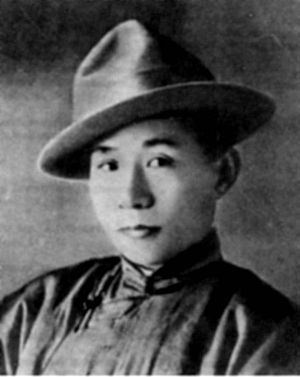Ingvar Ayuush: Difference between revisions
old>Puzikas No edit summary |
m (1 revision imported) |
(No difference)
| |
Latest revision as of 16:15, 4 April 2019
Ingvar Ayuush was a Dien-Dnieguan born businessman, translator and criminal. Conceved sometime during the Dnieguan annexation of Dienzeng, born before 1850, Ingvar would learn Dnieguan through assimilation and act from an early age as a translator for Dnieguan soldiers in and around his coastal city of Khlakhyn Nia Gol, which was a major staging point for Dnieguans entering the new world. He would be raised around and taught Dnieguan customs and cultures, eventually leaving to study in Dniegua in 1859 before returning in 1864, where he would build a business purchasing, refining and selling Esamon.
While not the largest exporter by gross, Ayuush would become the Easterner most associated with the exportation and importation of Esamon, and is widely credited with the popularization of Esamon in Dniegua in the 1870s. By 1884 the demand for Esamon was so high, many food farms had been converted to cultivating the valued crop, driving price down by over 80%. Unable to keep up with demand, Ayuush created a highly concentrated version of Esamon, a precursor to more modern, stronger Analgesics, which he distributed to native warriors like the Ghurka. After mounting a significant effort to poison these communities against the Dnieguans, they eventually began to rebel, burning significant Esamon plantations and Dnieguan-owned farms and business, as well as capturing and ransoming or murdering Dnieguans. Following the 1888 massacre of 128 Dnieguan Cossacks and Officers at Nord Mut Gol, the Dnieguan Hetmanate forced a surge of some 6,000 troops to Dienzeng to crush the rebellion, eventually swelling this number to over 32,000 troops from both the Army and Navy, as well as six Ranger orders.
Ayuush was reportedly an excellent speaker and ell mannered, and generally a wholesome individual on the exterior. Taking three wives in his life, he studied and followed the Dienzeng religion of Thain closely, and had a 750 square meter temple built on his estate. He was a frequent donner of charitable goods, and frequently was seen giving sermons in public. Though initially suspected as a possible culprit, Dnieguan Rangers found him to be without suspect in 1893, possibly due to significant contribution to the Dnieguan war effort.
In 1897 Dnieguan Rangers with assistance of Temuairs Imperial Marshal Service reopened an investigation of funds in Ayuushs name, eventually determining after capturing and interrogating one of his supply running ships crews that he was to blame for arming and funding the Dien rebels. A warrent was issued Febuary 3rd of 1898 for Ingvars capture, with the justice noting on the warrent "Death as a preferable alternative". On April 24th 1898 the Dnieguan 9th Ranger Order of Hetman Gustav VI set out with the 3rd Dien Volenteer Ghurka Rifle Company and 42 Marshals and Deputies to capture or kill Ayuush at his estate. Dien rebel scouts had spotted the large formation several days before arriving at his home, and a significant defensive force was raised. The resulting battle of Ashkaar Pin Lao eventually ended in the capture of Ingvar Ayuush, who was executed by the Dnieguan Volenteer Ghurkas founder, Rear Cornet Second Grade Malak Amar per then Governor-General Rymon Movnikals decree.
In Dienzeng, Ingvar is viewed in a mix light, with some viewing him as a public hero due to his significant charitable work and attempt to covertly throw the Cossacks from the native Dien peoples lands, while others argue his efforts only entrenched the Dnieguans further into Dienzeng, whom committed so much to ensure the nation did not fall from their grasp it became unpopular to discard it as a colony. Most historians agree that had Dniegua not been forced to war in Dienzeng, it likely would have been removed as a colony in the 1960s or 70s.
